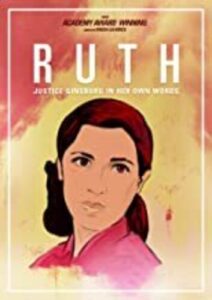Ruth — Justice Ginsburg in Her Own Words
Posted on February 12, 2021 at 5:40 pm
B| Lowest Recommended Age: | Middle School |
| Profanity: | None |
| Alcohol/ Drugs: | None |
| Violence/ Scariness: | None |
| Diversity Issues: | A theme of the movie |
| Date Released to Theaters: | February 13, 2021 |

We’ve had a feature film about Justice Ruth Bader Ginsburg’s early years (“On the Basis of Sex“) and an excellent documentary already (“RBG“). But if the late Justice Ginsburg were here today, she might prefer this documentary, featuring, as its title indicates, her own words, as she spoke them.
A few other people get to speak as well, including a colleague who worked with then-Professor Ginsburg on her ground-breaking briefs for her Supreme Court challenges to laws because they denied vital civil rights on the basis of gender. She says their goal was to see if they could get the briefs to “sing.” And “hers sang.” The elegance, grace, erudition, imperishable integrity, and inescapable logic of her legal writing was her superpower.
It almost seems laughable now that there was an Oklahoma statute allowing women to buy beer at age 18 but prohibiting men from buying it until age 21. Not only was there one, but Oklahoma felt so strongly about it they actually argued in support of it at the Supreme Court. The brilliance of Professor Ginsburg’s strategy was to bring cases that were unfair to men because of stereotypes about women. And so, she argued the case features in “On the Basis of Sex,” about a widower denied Social Security benefits because they were only given to single mothers, not fathers. And a case brought by a man who objected to the law making jury duty mandatory for men, but not for women, denying him a fully representative group. If the outcome of these cases seems obvious to us now, it is only because of Justice Ginsburg, who argued six gender discrimination cases before the Supreme Court, winning all but one.
Most of her career was before the ubiquity of cameras, so the archival footage that this documentary draws from public appearances, most of them involving her being honored. One especially touching scene has her returning to the grade school she attended as a child. Her face is luminous as she visits the First Grade classroom where she learned to read and the library, now named for her, that she loved.
This familiar with her work will recognize but enjoy the segments about her devoted husband Marty, her amusement at her iconic status, and her love for opera, including an opera based on her improbable friendship with her ideological opposite, Justice Scalia. We also get a glimpse of some of today’s biggest names in their younger days, President Biden as Senator and as Vice President, for example, and a more collegial era in politics as Justice Ginsburg was nominated and confirmed. And we learn about the impact of Justice Ginsburg’s majority decision requiring the Virginia Military Institute to accept qualified women. Somehow she was not persuaded by the lawyer who argued that WMI teaches “manly values that only men can learn.” Her dissents had an important impact as well, as we learn from Lilly Ledbetter, the namesake of landmark legislation tracking Justice Ginsburg’s dissenting opinion. (Be sure to stay for the credits to see Ledbetter again.) Here’s hoping her blistering dissent in the Citizens United case has as meaningful a result.
Those who want to understand the importance of Justice Ginsburg’s words should read her decisions, which mean more than the interviews and interactions in this film. It is not so much the words that matter here as Justice Ginsburg’s intellect and her “consuming love” for the law, her character, her kindness, her empathy, and her purpose. She says she wants to be remembered as “someone who cares about people and does the best she can with the talents she has to make a contribution for a better world.” This movies shows she did all that and more.
Parents should know that this movie concerns gender discrimination. There is no bad language or violence but there are references to a sad death of a parent to injustice.
Family discussion: Why did Justice Ginsburg become such a well-known figure? Why are her dissents so significant?
If you like this, try: “On the Basis of Sex” and “RBG”
